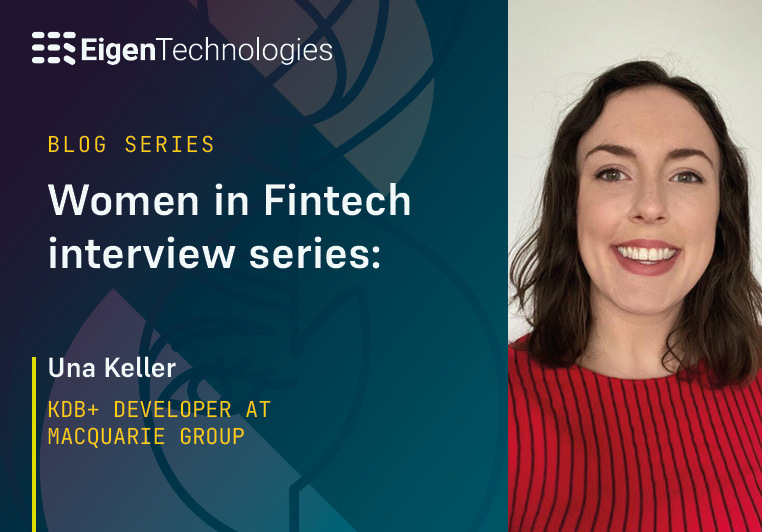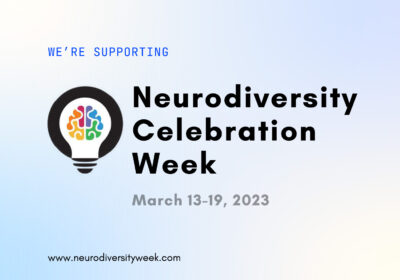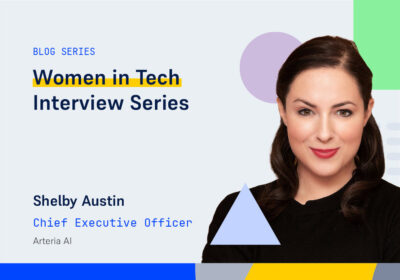Women in Fintech interview series: Instalment two with Una Keller KDB+ Developer at Macquarie Group
Last month we launched our Women in Fintech interview blog series inviting women, and those that champion them, to share their experiences and thoughts on gender diversity and inclusion more generally in the industry.
In this, our second blog in the series, we talk to Una Keller, a KDB+ Developer at Macquarie Group in London.
Una, why do you think there's a gender gap in fintech?
I think the problem starts at primary school. There’s a lack of encouragement and reinforcement that girls are good at maths, science and technology and as a result, they start doubting their abilities in these subjects. This is the start of a cycle perpetuated through a lack of female role models, teachers and professors in STEM in schools and universities. I was fortunate that my parents actively encouraged me to pursue an education and career in what I was good at and enjoyed which happened to be maths.
Why did you personally choose a career in fintech?
I was always good at maths and upon the advice of my maths teacher, I opted for a broad science degree at University College Dublin where I decided to focus on statistics. After university, I got a place on a graduate programme at a global software company serving the capital markets industry. Its structured training programme enabled me to learn on the job, explore roles within data science and software engineering, to find my niche and ultimately what I’m good at and love doing.
What is Macquarie doing to attract, retain and support women?
Macquarie has a broad spectrum of company and employee-led diversity and inclusion (D&I) initiatives in place including two employee networking groups: Balance and Women in Technology that exist to connect, encourage and empower women across the business. Company-led initiatives to attract, develop and retain female talent include female-specific training courses, for example, sessions that help female employees prepare for lightning talks. Macquarie also runs a reverse mentoring scheme where junior female employees are matched with male senior leaders, this enables the senior leaders to gain a different perspective and provides leadership exposure to the junior employees.
Macquarie also partners with and supports D&I-focused non-profits around the world including TeenTech, a UK charity co-founded by Maggie Philbin that helps teenagers gain the skills, experiences, networks and confidence they need to build a successful career in STEM. Macquarie is involved in TeenTech’s mentoring initiatives helping students understand the rewarding and varied career opportunities within science, technology and engineering and have also supported the TeenTech annual awards, where 60% of award entries come from female students
What do you think the industry is missing by not having more women?
Innovation. The industry needs people from a range of backgrounds with different experiences to draw upon to create ideas and help it to innovate. There’s lots of research published on how diversity powers creativity.
How important are male allies?
Male allies have a pivotal role to play especially teachers, professors, managers, leaders and those in the public eye that inform the choices of girls and young women. Unconscious bias must be eliminated, and women must be represented at things like university open days and referenced in coursework materials. Having more female role models will make it easier for people to visualise, normalise and inspire more women into these roles.
What advice would you give to women starting out in the industry?
I would advise them to speak up, find their voice and not be afraid to say if they don’t understand something. Ask for and give feedback. Being hard-working is only the start, you need to continue to learn and grow. I’ve never been afraid to ask a question or answer one incorrectly which has helped me to build my knowledge and confidence. And don’t let anyone tell you that you’re “good for a girl” as I was unfortunately once told by a fellow student at university.
If you’d like to be part of the Women in Fintech conversation and would like to share your experiences and thoughts, please get in touch.

-
World Economic forum 2020
-
Gartner Cool Vendor 2020
-
AI 100 2021
-
Lazard T100
-
FT Intelligent Business 2019
-
FT Intelligent Business 2020
-
CogX Awards 2019
-
CogX Awards 2021
-
Ai BreakThrough Award 2022
-
CogX Awards Best AI Product in Insurance
-
FStech 2023 awards shortlisted
-
ISO27001
-
ISO22301
-
ISO27701
-
ISO27017
-
ISO27018


















